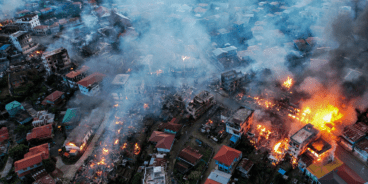
Atrocity Alert No. 40: Iraq, Myanmar (Burma) and Central African Republic
Atrocity Alert is a weekly publication by the Global Centre for the Responsibility to Protect highlighting and updating situations where populations are at risk of, or are enduring, mass atrocity crimes.
Iraq
On 23 January the Iraqi government announced the complete recapture of eastern Mosul, Iraq, from the Islamic State of Iraq and the Levant (ISIL), 100 days after the start of the offensive on the city. Iraqi Security Forces and Kurdish Peshmerga are expected to launch a similar campaign to retake western Mosul in the coming weeks. UN agencies, as well as several major humanitarian organizations, have raised concerns about the estimated 750,000 civilians still living in the ISIL-controlled western sector of the city, where living conditions are deteriorating sharply. Approximately 47 percent of the casualties in Mosul have been civilians, and an estimated 180,000 people have fled their homes since the offensive began on 17 October. The UN Humanitarian Coordinator for Iraq, Lise Grande, emphasized that all parties to the conflict must undertake effective measures to ensure the protection of civilians and uphold their obligations under international law as the battle for Mosul continues.
Myanmar (Burma)
On 19 January the Ministers of Foreign Affairs of the Organization of Islamic Cooperation (OIC) convened an Extraordinary Session in Malaysia regarding the situation of the Rohingya Muslim minority in Myanmar. The group released a Communiqué calling upon the OIC Secretary General to coordinate with the Myanmar government to allow a high-level OIC delegation to visit Rakhine state, where security operations targeting Rohingya civilians continue. The Communiqué also requested OIC representatives to engage with the UN and other international organizations regarding the persecution of the Rohingya. The OIC Envoy to Myanmar said the group should support a UN intervention to avoid “another genocide like in Cambodia and Rwanda.”
On 20 January the UN Special Rapporteur on the situation of human rights in Myanmar, Ms. Yanghee Lee, concluded a 12-day visit to Myanmar, which focused on the ongoing conflicts and humanitarian crises in Kachin and Rakhine states. At the conclusion of her visit Special Rapporteur Lee noted allegations of ongoing human rights abuses in both states, and also raised alarm regarding widespread fear amongst civilians of potential reprisals by the government as punishment for speaking out.
Central African Republic
On 25 January the UN stabilization mission in the Central African Republic (MINUSCA) and the UN Office for Humanitarian Affairs both warned of rising tensions between armed groups in Ouaka Prefecture, including elements of the ex-Séléka and anti-Balaka militias. The UN’s Acting Humanitarian Coordinator in CAR raised fears of “an explosion of violence” in and around Bambari and its “repercussions on the protection of civilians.” The Humanitarian Coordinator noted that a return to open conflict in Bambari would seriously endanger the more than 26,000 displaced people in the city. MINUSCA responded that peacekeepers “will use all means, including force” to protect civilians in Bambari. Insecurity in CAR during 2016 also resulted in more than 365 security incidents involving humanitarian organizations, making CAR one of the most dangerous places for humanitarian workers in the world.


